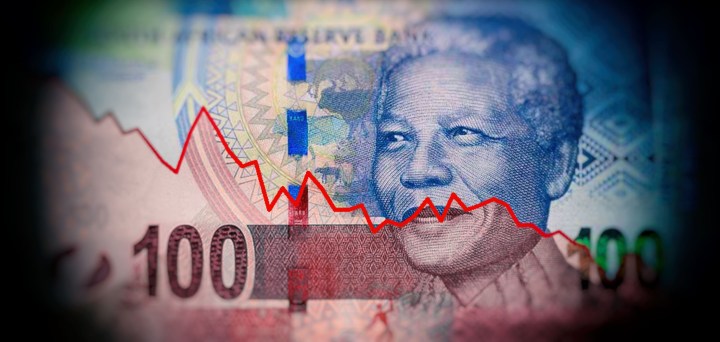BUSINESS MAVERICK
Fitch downgrade pours more salt into the gaping wound that is the SA economy

Rating agency Fitch has downgraded South Africa’s credit rating, pushing it further down the junk scales. The downgrade sent the rand hurtling to fresh historic lows against the dollar.
Rating agencies have been busy of late as the Covid-19 pandemic wreaks unprecedented havoc on the global economy. Perhaps they should just relocate to the moon and downgrade planet Earth.
South Africa got its second lockdown downgrade on 3 April 2020 when Fitch – which three years ago had assigned Pretoria’s debt a “junk rating” – dropped its rating another notch to “BB” from “BB+”. The rand, which has been on the ropes for a long time, took another beating, hitting fresh lows above 19 to the dollar. The consolations are that the oil price has tanked and that (#affluentclass/WMC/ANC/EFF), no one is taking an overseas trip anytime soon.
Fitch also placed its outlook on “Negative”, which means it expects to pull the trigger again. This move, of course, followed Moody’s 27 March 2020 downgrade, which cemented South Africa’s credit status as junk across the board. It is well known that this means investors will demand a higher rate of interest for lending, which will raise borrowing costs and leave less money available for things such as, well, healthcare.
South Africa also loses its status in various bond indices, so some of the large institutions with big (but presumably now), shrinking pockets will be prohibited from buying the country’s bonds. This is forecast to trigger a big forex outflow as foreign investors dump South African debt.
South Africa’s first primary bond auction after the Moody’s downgrade for R4.5-billion rand, was four times oversubscribed, so maybe the big guns are not needed.
To return to Fitch. It was typically clinical in its language.
“The downgrade of South Africa’s rating is a result of the lack of a clear path towards government debt stabilisation as well as the expected impact of the Covid-19 shock on public finances and growth. The Negative Outlook reflects the prospect of further significant upside pressure on government debt and additional downside risks associated with the global shock,” the rating agency said in a statement.
“The Covid-19 crisis, combined with a recession in 2H19, means South Africa’s GDP is forecast to contract by 3.8% in 2020 and Fitch expects only a moderate recovery by 1.7% in 2021. The contraction primarily reflects a 21-day lockdown, during which large parts of the economy, including most mines and manufacturing plants, have ceased operating. The government has stated that the lockdown will not be extended, but many sectors may see continued significant disruption and global demand will remain adversely affected for some time,” it said.
Fitch also gave the following projections for the budget deficit and overall debt levels, which is its bread and butter.
“We expect the consolidated fiscal deficit to surge to 11.5% of GDP in FY20/21, from 6.6% in FY19/20, with a recovery to a still-high 8% in FY21/22. This means that general government debt … will rise from 64.5% of GDP in FY19/20 to 80.2% in FY21/22, well above the 2019 ‘BB’ category median of 46.5%.”
Such projections, of course, at this time are really nothing more than thumb sucks – no one can really predict where things are going. Frankly, a 3.8% contraction looks optimistic. It doesn’t take a rocket scientist to see that South Africa’s debt levels are set to mushroom because SARS can hardly meet the targets it set for itself for revenue collection because so few people are working and so many businesses, big and small, may collapse and because people are spending a lot less money as a result, because they don’t have money to spend. And so on.
It raises an interesting question, which was put forward last week in these pages by Kerstin Engler, a senior wealth manager at Geneva Management Group.
“One minor consolation is that South Africa is not alone in the economic challenges it faces. Most economies around the world are under pressure, facing something unprecedented. Knowing this, shouldn’t rating agencies put their decisions on hold in extraordinary circumstances?” she wrote.
That is a pertinent question. You would have to reside on the dark side of the moon not to realise that something unprecedented had just smashed into the global economy. BM



















 Become an Insider
Become an Insider